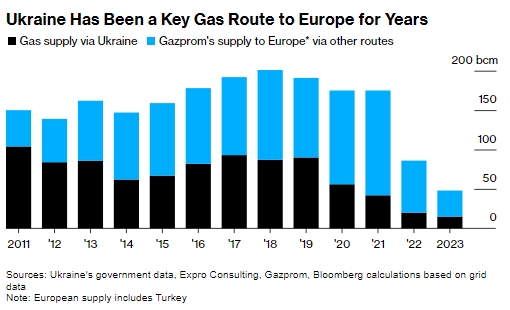EU discusses two options for preserving gas transit through Ukraine
 Illustrative photo (Getty Images)
Illustrative photo (Getty Images)
European energy ministers are set to discuss the ongoing import of Russian natural gas, which continues to flow into the region despite the war in Ukraine, which is now entering its third winter. Two potential options are on the table, but a deal remains far from being reached, citing Bloomberg.
At a meeting in Luxembourg on October 15, ministers from 27 countries will assess the region's readiness for winter, as a key gas transit agreement between Moscow and Kyiv is set to expire on December 31. The need to ensure energy security has pushed the bloc to seek new gas supplies, driving up energy prices and placing strain on the regional grid.
Bloomberg notes that Europe must continue to wean itself off Russian fossil fuels by reducing gas consumption and accelerating the development of renewable energy sources. The Ukrainian pipeline remains one of two routes left for Russian gas flows into Europe, but liquefied natural gas (LNG) exports are still entering the EU in large volumes.
Two options
Talks aimed at replacing transit flows are ongoing, but an agreement seems distant with less than three months remaining before the current one expires. Both Kyiv and Moscow have expressed a willingness to find a solution, which could potentially involve Azerbaijan.
According to anonymous sources familiar with the matter, a final decision is likely to come at the last minute or even in early 2024.
Slovakia, alongside Austria, remains a key buyer of transit gas and would prefer to continue using this route. One of the options being discussed is replacing Russia with Azerbaijan as the supplier, but the details of how this would work are still unclear. Given the limited supply, gas exports from Azerbaijan to Europe would require some form of swap with Russia, making such a deal politically contentious.
Another option is for Azerbaijan's state oil company SOCAR to take over Gazprom’s role and sell gas directly to Europe, or the company could organize the transit of gas through Ukraine.
Sources indicate that the volume needs to be around 10-11 billion cubic meters to ensure smooth transportation through Ukraine's extensive pipeline system. Lower volumes would necessitate additional gas injections, making the operation unprofitable.
"It is a Ukrainian decision how to deal with the pipeline, so it’s also their responsibility and their right to deal in a proper and responsible way with that," said European Commission President Ursula von der Leyen last month.
Moscow – unreliable supplier
Relations between Russia and Ukraine over gas transit have been fraught since the collapse of communism, with disputes leading to two supply cuts in 2006 and 2009.
The European Commission, which has mediated deals between the two nations over the past decades, is not facilitating any negotiations this time. It has repeatedly said that Europe could endure a halt in Russian gas transit through Ukraine without compromising its energy security.

EU gas storage facilities are full and flows through the Ukrainian route currently account for less than 5% of the continent's supply. However, for countries like Slovakia and Austria, finding new importers could mean higher prices, which is politically unpopular.
For more details on potential gas supplies after 2024, see RBC-Ukraine's article "Russia aims to maintain gas transit to EU through Ukraine: What’s in it for Putin and Gazprom?"

